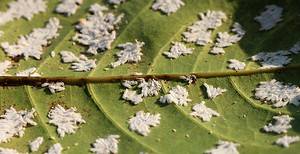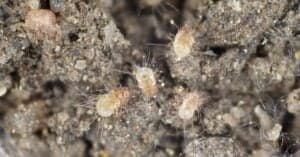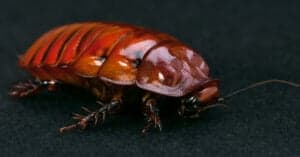Biting insects is something that everyone tries to avoid. When having a picnic, the last thing you want to worry about is biting insects landing on your food or your skin. A common method of bug repellent has been the use of bug zappers.
People have long touted bug zappers as effective in keeping pesky insects away. They work by emitting a UV light that attracts bugs to the device. An electrical section is in the center of the device, between metal grids. This section electrocutes any bugs that come in contact with it. While this seems like it would be an effective pest control method, it has some drawbacks that make it a less-than-adequate option. This article will cover the top three reasons you should put away your bug zappers.
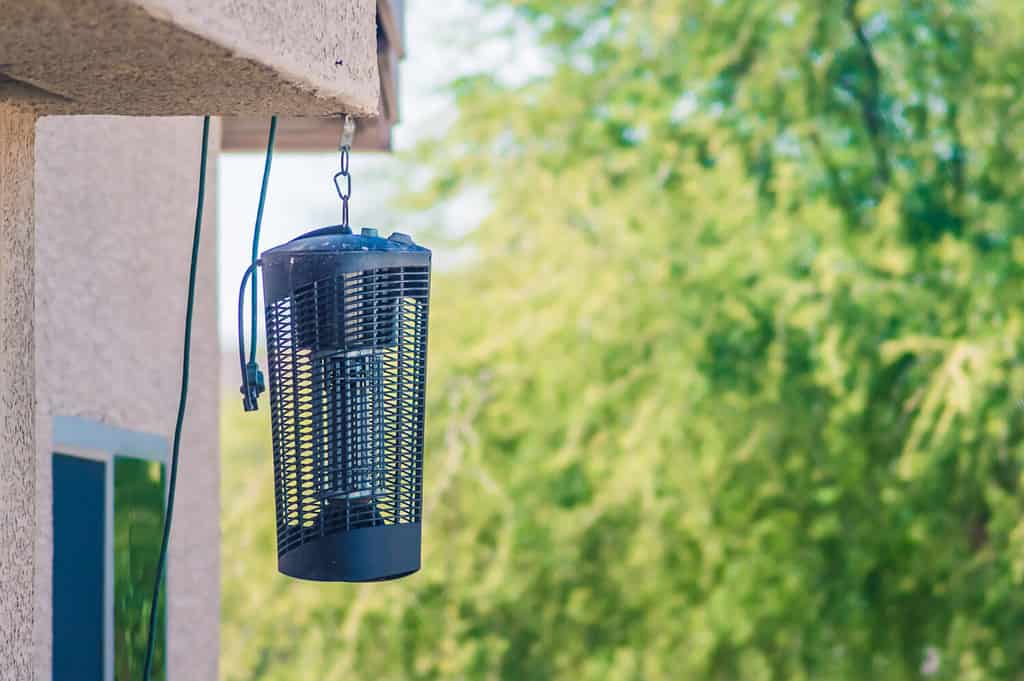
Bug zappers work by emitting a UV light that attracts bugs to the device. Once the bugs fly to the center, it electrocutes them.
©GreatSnapz/Shutterstock.com
3 Reasons You Should Put Away Your Bug Zappers
1. They Kill Beneficial Bugs
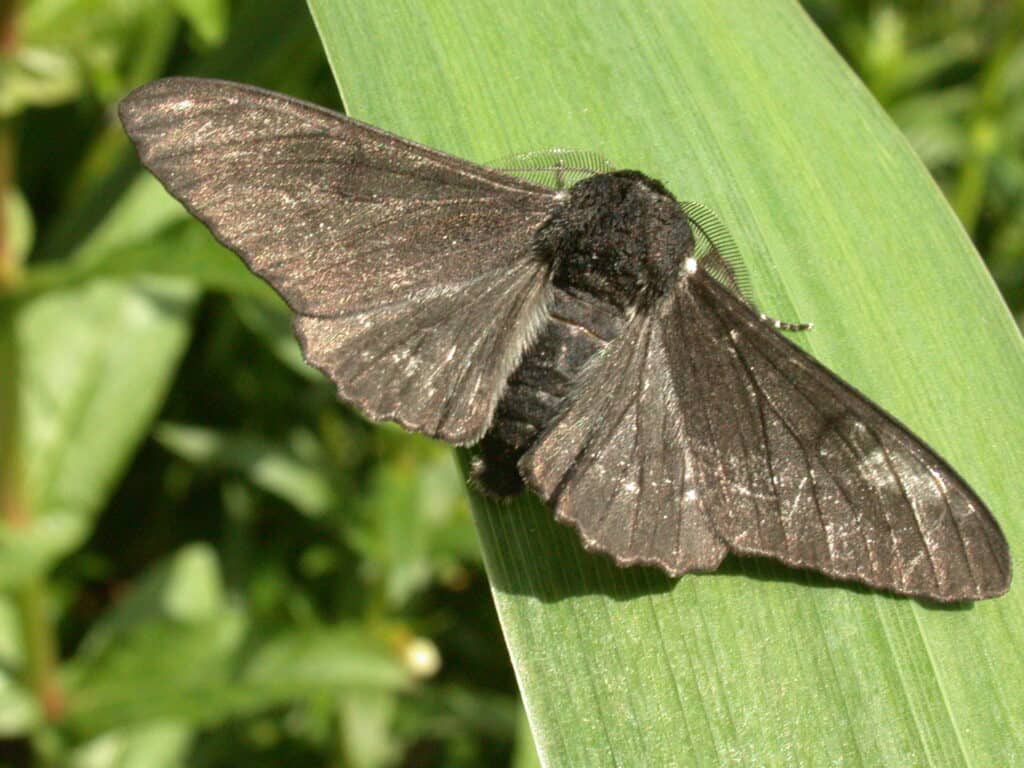
Moths are very important to the ecosystem as they are pollinators, helping plants to grow.
©Steve McWilliam/Shutterstock.com
While many purchase bug zappers to kill pesky insects such as mosquitoes, it is not entirely effective. Usually, mosquitoes and other biting insects are not attracted to the UV light emitted by the bug zappers. The American Mosquito Control Association conducted two studies on the effectiveness of bug zappers and mosquito elimination, “mosquitoes comprised merely 4.1% and 6.4%, respectively, of the daily catch over an entire season.”
If only 4.1-6.4 percent of bugs killed were mosquitoes, what types of bugs made up the remaining percent? Most bugs that these bug zappers trap are beneficial for the environment. Pollinators like moths willingly dive head-first into these zappers because they are attracted to the light. Additionally, the parasitic wasp — who attacks various pests that feed on crops — is another unintentional victim of the bug zappers.
Besides impacting our crops —whether through a lack of pollination or pests consuming them — experts also worry about the gap in the ecosystem that these zappers can cause. Animals like bats, which feed on insects nocturnally, could be significantly affected by the reduced insect population due to bug zappers. The effects would continue through the food chain and cause long-term consequences.
2. They Attract Bugs
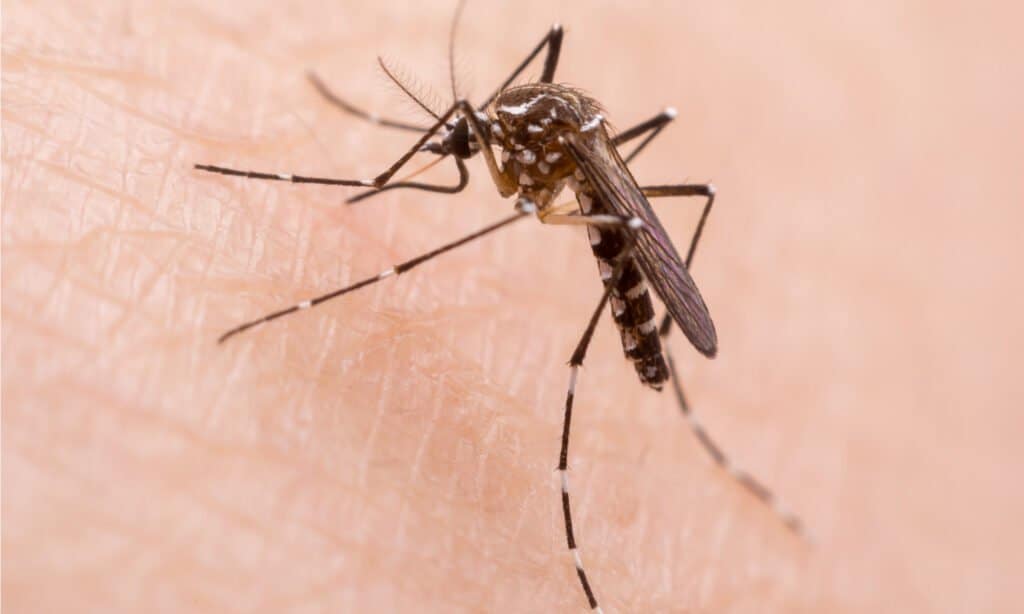
Mosquitoes carry some of the most dangerous parasitic diseases.
©Surachai Pung/Shutterstock.com
The bug zapper technically does its job with mosquitoes because the light attracts them and draws them near. However, once in the vicinity, they are much more attracted to your smell and blood than the zapper’s light. Therefore, the instrument meant to eliminate mosquitoes from the vicinity is bringing them closer to you.
A study conducted by Iowa State University indicated that “4 million bug zappers operating for 40 nights each summer would destroy in excess of 71 billion nontarget insects each year. And the number of mosquitoes would still be the same as before.” With those numbers, it is evident that a bug zapper is not worth the purchase.
3. They Release Dangerous Bacteria From Bugs
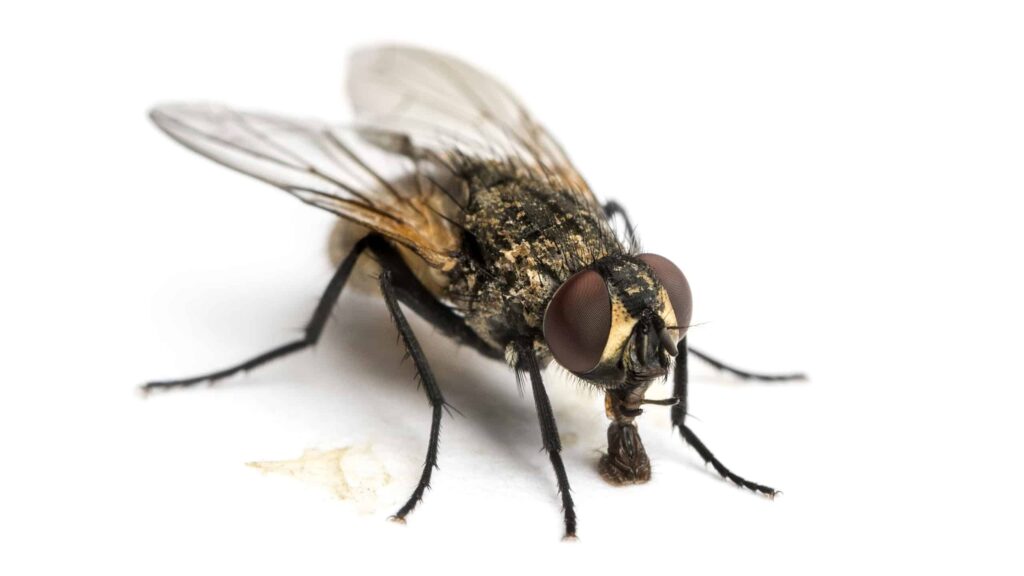
When bugs are electrocuted in the bug zapper, they release high numbers of airborne insect particles.
©Eric Isselee/Shutterstock.com
Many people concern themselves with the diseases that insects carry. Common culprits that induce this fear are ticks and mosquitoes, both of whom have bites that can infect the host with many diseases. A less often thought-of route to exposure is through the bug zapper. That is right; while it may kill some pesky insects, it also introduces nearby individuals to the spread of bacteria.
Kansas State University conducted a study that “quantified spread of bacteria and bacterial virus during electrocution of house flies.” Experts do not recommend using bug zappers around any area with food, hospitals, or areas where the control of insects is important because of the risk of attracting more bugs and spreading bacteria and viruses. One of the study’s authors discussed how bug zappers result in “the generation of high numbers of airborne insect particles.” He continued, “That presents an additional problem because we can breathe those particles, and it is well documented that insect particles can be very allergenic.”
It is an easy assumption that a housefly is too small to be able to spread that much bacteria. While it is true that only about 1 in the 10 million of the viruses in the fly were released, one of the authors commented, “We were surprised to see as much microorganism dissemination as was the case…we’re finding really significant amounts on the surface of the fly will survive.”
Summary of the 3 Reasons You Should Put Away Your Bug Zappers
| Rank | Reason | Details |
|---|---|---|
| 1 | They Kill Beneficial Bugs | In a study, only 4.1-6.4 percent of bugs killed by these zappers were mosquitoes. |
| 2 | They Attract Other Bugs | The UV light may attract insects to the area that otherwise would have had no interest. |
| 3 | They Release Dangerous Bacteria From Bugs | Bug zappers result in “the generation of high numbers of airborne insect particles.” |
Natural Ways to Rid Yourself of Pests
If you want to rid yourself of pesky biting insects but do not want to use a bug zapper, you are in luck! There are various other methods to rid yourself of unwanted insects; some of them are completely natural! There are many aromatic plants that you can use to help draw mosquitoes away from your scent. It should be noted that planting them in your yard might not suffice, but rubbing the leaves on your skin and clothing proves effective.
Here are just three of the many scientifically proven plants to repel mosquitoes so you can finally put away your bug zappers.
Lemon Eucalyptus

The oil from this plant was found to be effective against mosquitoes 95 percent of the time.
©RutySoft/Shutterstock.com
The oil from this plant was found to be effective against mosquitoes 95 percent of the time and works for up to three hours. It is even recommended by the CDC! This oil is an active ingredient in many mosquito repellent sprays, but you can also buy the oil in a health food store and create your own solution. When creating your own solution, be sure to mix the oil with a skin-friendly carrier oil.
Citronella
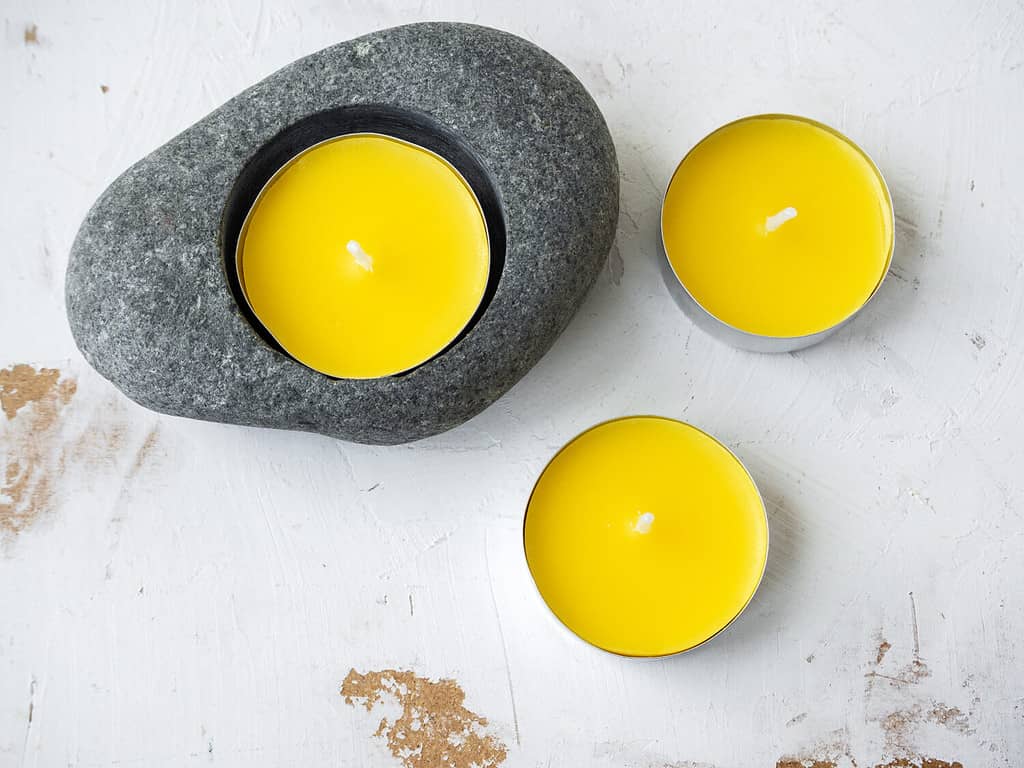
The most common use of citronella for anti-mosquito use is through candles.
©Ana Belen Garcia Sanchez/Shutterstock.com
Many people burn citronella candles to help keep mosquitoes at bay. While it does help keep mosquitoes away, it is surprisingly not as effective as some of the other plants. In fact, citronella candles only had a success rate of 14 percent.
Castor

Mosquitoes do not like the strong scent that comes from the seeds of the castor plant.
©Alexander Ruiz Acevedo/Shutterstock.com
The castor seed contains a strong scent that mosquitoes do not like, so it keeps them away quite effectively. You can purchase castor oil in any pharmacy or grow a castor plant yourself. You can find the seeds in garden centers.
In addition to mosquitoes, another pesky insect can be flies. Here are three natural ways to keep the flies away: smells that flies hate!
Rosemary

You can use rosemary as a fly deterrent by either placing fresh springs in the area or creating a room spray with oil and water.
©iStock.com/Artfully79
The smell of rosemary is unattractive to flies and provides an excellent shield against these annoying insects. You can place fresh sprigs in an area that is affected by the flies, or you can place a few drops of rosemary oil on a cotton ball and put those balls in high-traffic fly areas.
Eucalyptus

Eucalyptus is one of the best natural fly repellents.
©iStock.com/Marina Denisenko
This plant has a strong odor that flies find unbearable. It is one of the best natural fly repellents. You can use this as a repellent by placing eucalyptus leaves around where the flies frequent, or you can create a spray with the oil and water and spray it around your home or the affected area.
Lavender
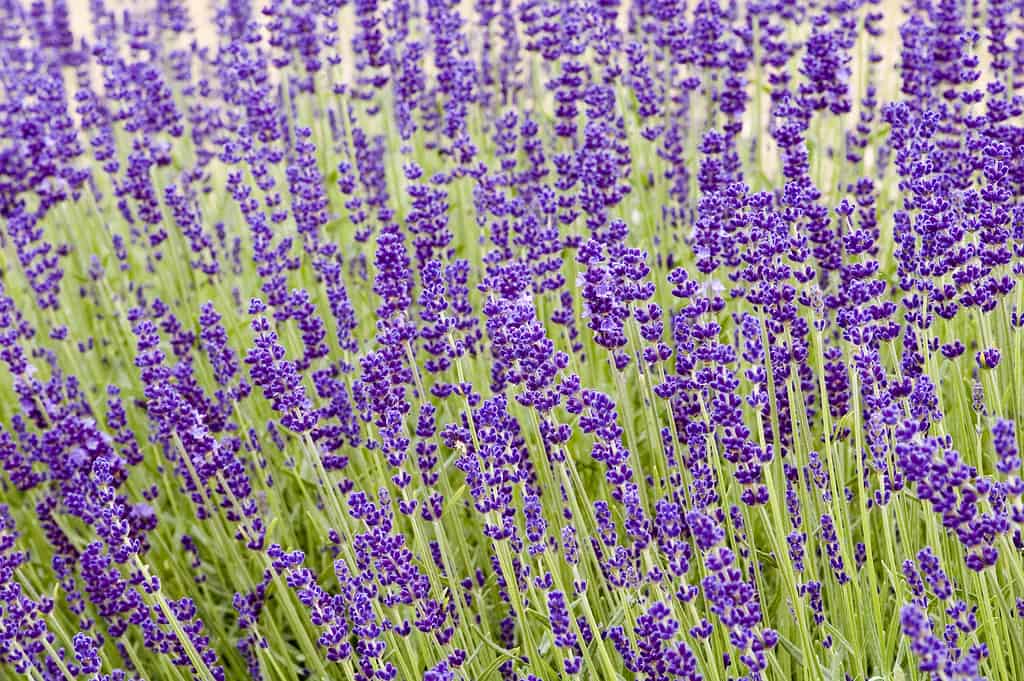
Although people find this smell pleasant and calming, the smell of lavender is repulsive to flies.
©gardendata/ via Getty Images
The smell that we love as humans that this plant omits is what is so repulsive to flies. The strength of lavender’s scent overwhelms their senses. Due to this overload, flies cannot stand to be near this plant.
The photo featured at the top of this post is © iStock.com/D. Homer
Thank you for reading! Have some feedback for us? Contact the AZ Animals editorial team.




